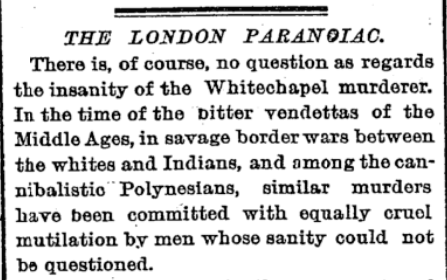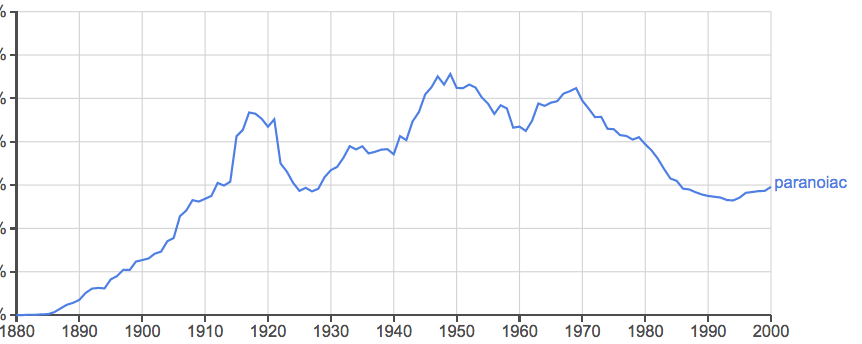"Paranoiac"
« previous post | next post »
Heather Murphy ("Scaramucci Did Not Invent the Word 'Paranoiac'", NYT 7/28/2017) quotes some tweets in which paranoiac "faced charges of being not being real" [sic], and comes to its defense with a link to a very interesting paper about a use of the word (but in Russian!) in 1927 — J. Kesselring, "Vladimir Mikhailovic Bekhterev (1857–1927): Strange Circumstances Surrounding the Death of the Great Russian Neurologist", European Neurology 2011.
I'm grateful for the link to Dr. Kesselring's story about Dr. Bekhterev and his fatal examination of "a paranoiac with a short, dry hand", namely Josef Stalin.
But Ms. Murphy could have appealed to her own paper's index, which indicates that the word paranoiac was used in 759 NYT stories before Mr. Scaramucci called Ryan Lizza on July 26, starting with "The London Paranoiac", 10/10/1888:

…and continuing right up to the day before Ryan Lizza's report of the Mooch's rant — Alexandra Alter, "‘Minecraft: The Island’ Blurs the Line Between Fiction and Gaming", NYT 7/26/2017:
Mr. Brooks — a cheerful, enthusiastic paranoiac who is obsessed with survival strategies, zombies, apocalyptic scenarios and plagues — wrote the story as a first-person, Robinson Crusoe-esque narrative, featuring an initially hapless character who is stranded on a strange island and has to build shelter, find food and fight off zombies and giant spiders, all features that exist in the game.
The word was used in a political context a few weeks earlier — Husain Haqqani, "To Win Afghanistan, Get Tough on Pakistan" NYT 7/6/2017:
The recent rise in Islamophobia in India and a more aggressive stance against Pakistan by Prime Minister Narendra Modi should not detract from recognizing the paranoiac nature of Pakistan’s fears.
Ms. Murphy quotes a current authority on the word's decline in scientific contexts:
Dr. Kenneth S. Kendler, a psychiatrist who reviewed the latest research on paranoia for the Schizophrenia Bulletin last year, said that the word “paranoiac” hadn’t been used much in mental health literature since the 1930s.
But the word's trajectory in the Google Books ngram viewer suggests that the word's popularity in general publications has perhaps been more a matter of war and peace than of psychiatric fashions:

Phillip Minden said,
July 30, 2017 @ 9:50 am
It seems he formed it anew as a portmanteau of paranoid and schizophreniac. Whether somebody else used it before in a different meaning isn't relevant.
[(myl) "Seems"? Is there any evidence? Since paranoiac is roughly four orders of magnitude more frequent than schizophreniac, this hypothesis "seems" likely to be false.]
Levantine said,
July 30, 2017 @ 9:50 am
I know the word from Turkish (paranoyak, from Fr. paranoïaque), where it is still current and used in the same sense intended by Scaramucci. I'll never understand why people don't first Google such things before imputing linguistic ignorance to others.
Philip Lawton said,
July 30, 2017 @ 10:19 am
I'm only familiar with the word from this interview with Dali, from 1963.
https://youtu.be/iGYhGdv-kLc
AlexB said,
July 30, 2017 @ 10:54 am
There was, of course, the Belgian garage rock band 'The Paranoiacs' (Wikipedia article in Dutch)
https://nl.wikipedia.org/wiki/The_Paranoiacs
Rodger C said,
July 30, 2017 @ 11:05 am
I can remember an era when I saw "paranoiac" more frequently than "paranoid"–in fact anytime before the 70s, I dare say, when "paranoid" escaped from dope language to mean "exaggeratedly fearful" or simply "fearful." Nowadays, though, "paranoiac" sounds as if someone is thinking in a Romance language (just sayin).
Andrew (not the same one) said,
July 30, 2017 @ 11:10 am
It is rather odd that he used 'paranoid' and 'paranoiac' in the same sentence. This does give some force to Philip Minden's theory, I think; that he was somehow aiming at a compound, rather than just using a regular word for 'person with paranoia'. (It's not entirely clear how you would combine 'paranoid' and 'schizophrenic'; 'paranic' does not convey the idea very clearly.)
Thorin said,
July 30, 2017 @ 11:39 am
This reminds me that I often hear arachnophobic people called "arachnophobiacs", but not as often for others (homophobe, germophobe, Islamophobe).
Lazar said,
July 30, 2017 @ 1:03 pm
My understanding has been that paranoid is the adjective for someone suffering from paranoia, and that paranoiac is the noun (although, checking now, apparently each word can be used either way). Scaramucci's phrasing, impropriety aside, didn't strike me as unusual or innovative: he was suggesting (figuratively, let's hope) that Priebus was suffering from paranoid schizophrenia, and then re-emphasizing the paranoid part.
GeorgeW said,
July 30, 2017 @ 2:10 pm
Phillip Minden: When I first read it, I thought the same thing given the context: ". . . a fucking paranoid schizophrenic, a paranoiac." He is describing someone with both conditions.
Anthony said,
July 30, 2017 @ 4:37 pm
I think maniac and hypochondriac are the only "person with" forms for mania and hypochondria.
Kyle MacDonald said,
July 30, 2017 @ 9:10 pm
It is also used in French. Going by Wikipedia, it appears to be current usage in psychology (though not in reference to paranoid schizophrenia). It also appears in the 1976 French-language musical Starmania, with lyrics by the French-Canadian lyricist Luc Plamondon. The appearance is in the song "Un enfant de la pollution". The line is "Les oiseaux, les crapauds, ça me rend paranoïaque", at 0:44 in this video: https://www.youtube.com/watch?v=oLu2zjHLLWs.
cameron said,
July 30, 2017 @ 10:31 pm
I'm surprised there's any controversy about that word. It's a perfectly normal usage. Downright cromulent, you might say.
Bob Edgar said,
July 31, 2017 @ 4:52 am
But what about 'take a meeting'? Am I the only one that finds it peevable?
OK, I've been away in Germany for a while so perhaps this is now a normal usage in USE. It seems wierd to moi.
Ralph Hickok said,
July 31, 2017 @ 8:09 am
I first encountered the word "paranoiac" when I read "The Caine Mutiny" when it was published in 1952. IIRC, the defense attorney, Barney Greenwald, goes to some length to explain the difference between "paranoiac" and "paranoid."
J.W. Brewer said,
July 31, 2017 @ 9:51 am
It's cromulent enough in 2017 to be used in the title of a new song by Alice Cooper. http://teamrock.com/news/2017-06-08/alice-cooper-teases-new-single-paranoiac-personality
Obviously a songwriter might choose between "paranoid" and "paranoiac" not based on alleged fine nuances of meaning but because one might fit better than the other in a particular place as a matter of meter and/or rhyme. Although the titular word never actually appears in the lyrics of the Black Sabbath classic "Paranoid," so that choice must have been made on other grounds.
ajay said,
July 31, 2017 @ 3:29 pm
Thorin: and, moving from phobias to philias, "haemophiliac" but not, for example, "bibliophiliac" – we'd say "bibliophile".
AntC said,
July 31, 2017 @ 4:56 pm
"The Mooch" didn't last long enough to actually take up the post: sacked by Gen. Kelly, who was brought in to replace the alleged "paranoiac".
When the history of this Presidency is written, will any of us rememember who was "The Mooch"?
I suspect the shock at the stream of profanities will rapidly be overtaken by even worse affronts.
CuConnacht said,
August 1, 2017 @ 5:45 pm
Bob Edgar: In Annie Hall (1975), Woody Allen makes fun of "take a meeting" as Hollywood English. A brief overheard conversation in which the phrase occurs half a dozen times ends with "All the good meetings are taken."